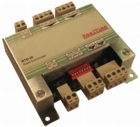Energy savings in the bank

Just how much energy can be saved by effective controls? A high-street bank in Wales achieved over a third, as Scott McGavin and Dr Richard Fargus explain.
With the need for ever more energy-efficient HVAC systems, building-services engineers need to remain constantly vigilant about how to reduce carbon emissions. However, today’s climate-control systems are already highly efficient, so to achieve further energy savings we need to explore how these systems are controlled to reduce consumption and increase overall energy efficiency. A recent live trial of a retrofit intelligent control system demonstrated the actual energy savings possible and the potential for such systems to pay for themselves very quickly.
The recent unveiling of the Government’s fourth carbon budget, which requires emissions to be cut by 50% from 1990s levels by 2027, means that developers and managers need to focus on ways in which energy usage in existing buildings can be reduced. Climate-control systems, which are typically responsible for a significant proportion of energy consumption within buildings, including the retail sector, are an obvious target for improvements in efficiency. Staff will frequently run systems at unnecessarily high heating or low cooling points, with the result that energy use is excessive and inefficient. It can be difficult to change this behaviour voluntarily or to deliver reduced usage without staff or customers experiencing discomfort.
The solution could be a flexible and intelligent system that allows a building manager to set parameters and reduce the need or desire for human intervention — whether this is to control temperature or make energy savings. Replacing entire HVAC systems is not always practical or cost-effective, so a ‘plug-in’ controller that fits onto existing systems is an approach that could work. The RTD-20 intelligent retail optimiser from Daikin UK has been developed especially to improve energy-efficient control in retail outlets and was installed in a retail banking outlet in Wales as a trial project.
The test site comprised a mix of customer and staff zones totalling over 300 m2 and with a range of cooling and heating requirements
Supplier billing data and whole-site half-hourly energy consumption data was available for 2009 and 2010. During this period, staff could operate air-conditioning manually. It was not time controlled and was typically operated all hours of the day, throughout the week.
To make the trial a fairer comparison between times when sites are usually occupied and HVAC systems operated on timers, the half-hourly energy-consumption data was extracted for these periods in order to compare savings. Additionally, a formula for comparing loads due to seasonal variations was also used to ensure the way the results were assessed was more realistic than a simple side-by-side comparison. If anything, the test was biased slightly against the RTD-20, so results can be viewed as being on the conservative side.
The data from the period before the RTD-20 was installed showed a consistently high daily consumption, even during periods where HVAC use would be expected to be low. The operating data suggested that combined heating and cooling was occurring, even in Spring and Autumn when very little active temperature control should be necessary.
By comparison, the data from the period when the RTD-20 was in place shows that HVAC use increased in proportion to the expected seasonal loading. This meant that the temperature at the site was being controlled in a much more energy-efficient manner, so that consumption of energy matched the actual conditions of the locale to maintain comfort levels — preventing unnecessary operation. When compared alongside the seasonal loading formula, energy use for the two periods shows that the RTD-20 controlled HVAC used less energy for a majority of time than in the period before it was installed.
On completion, the trial found that energy use was 35% lower with the intelligent control system in place. Given the number of approximations used, it is reasonable to assume that at worst, the saving was 30% and given the weighting against the controller and all approximations used being fairly conservative, it’s not unreasonable to suggest that savings of 40 to 50% are feasible.
During the trial, the staff at the bank were aware that some changes had been made, as they no longer had free control over HVAC units, and informal questioning was used to determine if any perceived changes in comfort had occurred. No complaints were received that could be attributed to changes in the system. In fact, as there was less heavy cycling of units producing either very hot or cold air, which can be a source of discomfort to occupants, it can be argued that comfort levels actually increased.
The trial concluded that there was no noticeable negative effect on the site in terms of comfort — but what about the bottom line?
Taking the figure of 35% reduction in energy use translates to an annual saving of £1683. The cost of the control hardware, including retrofitting the equipment, was about £2600, so the intelligent control system will have paid for itself in around 18 months and would deliver net running cost savings after this.
The clear conclusion from this trial is that the Daikin RTD-20 retail economiser intelligent, modular controllers, which can be retrofitted to existing HVAC installations, will quickly deliver real savings and boost a company’s carbon-reduction credentials significantly.
Scott McGavin is with Daikin UK, and Dr Richard Fergus is with RealTime Control systems.








